2025 China Automotive Product Quality Performance Research Results Released
The 2025 China Automotive Product Quality Performance Study (AQR) results were released, and an award ceremony was held in Beijing on September 25. The event was jointly organized by CheZhiWang and Carry Insights Consulting, with the theme "Quality Leading Safety in Intelligent Scenarios." Nearly a hundred senior executives from car companies, industry experts, scholars, and media representatives gathered to discuss innovative practices and development trends in improving automotive product quality in intelligent scenario applications and safety performance.
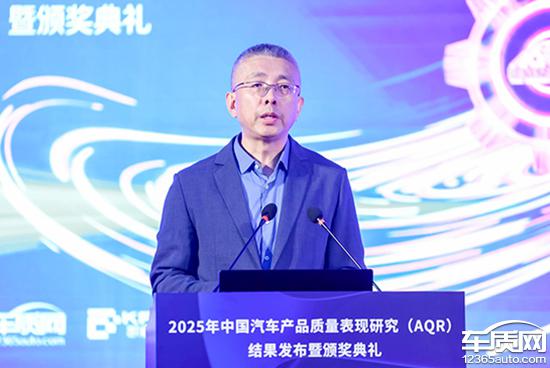
Tang Weiguo, Chairman and President of Chezhuwang and Kairuisaichi Consulting.
In his opening speech, Tang Weiguo, Chairman and President of Chezhuwang and Kai Rui Sai Chi Consulting, stated that the intelligence in the automotive field is entering a deep-water zone, with functions deeply integrated into real driving scenarios, and quality determines whether these functions can truly translate into value perceivable by users.
He pointed out that from January to August this year, CheZhiWang received over 150,000 valid complaints. Issues related to the quality and service of smart functions such as in-car connectivity, driving assistance, and OTA upgrades consistently ranked among the top 20 complaint points. The survey from Kairui Saichi Consulting also shows that the number of issues related to delays and lag in remote control via mobile apps is rapidly increasing in 2025. Consumers' concerns and anxieties are gradually shifting from "range" to "smart experience."
At the event, he also shared his experiences from this year's interactions with senior quality managers in the automotive industry: the alignment between product quality and consumer demand should move from meticulous to ultimate; service response should be both fast and smart, transitioning from timely to real-time; and full lifecycle management should progress from hardware inspection to achieving a closed-loop with OTA upgrades, enabling problem prevention.
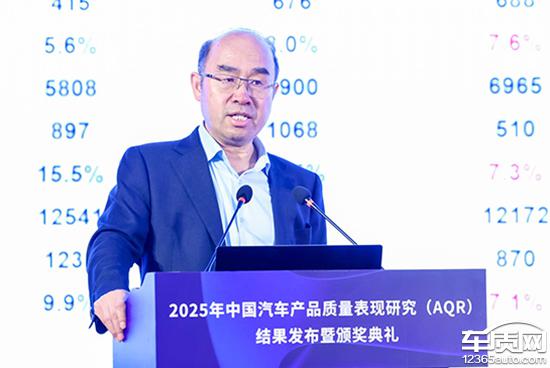
Xu Changming, former deputy director of the National Information Center, senior economist.
Xu Changming, former deputy director of the National Information Center and a senior economist, pointed out that the automotive industry should particularly emphasize high-quality development. He suggested that Chinese automotive companies maintain stable profitability without relying on squeezing upstream and downstream partners; control an appropriate level of debt, strengthen the inherent attributes of products such as reliability, durability, and safety, and pay attention to marketing strategies; at the same time, they should cultivate a sense of competition and cooperation.
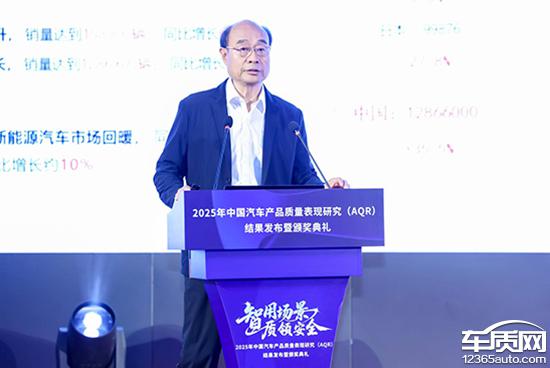
Vice Chairman of Che Baihui, Professor-level Senior Engineer Shi Jianhua
Vice Chairman of Che Baihui and Professor-level Senior Engineer Shi Jianhua analyzed the development trends of the new energy vehicle industry. He believes that the global automotive market has entered a stock competition stage, with the Chinese automotive market experiencing stable growth and electrification maintaining a high growth rate. By 2030, the penetration rate of new energy vehicles in China is expected to exceed 70%. Chinese consumers have significantly increased their demand for differentiation, personalization, and intelligence in automotive products, and domestic brands are better able to match consumer preferences. It is predicted that by 2030, the market share of domestic brands will exceed 65%. With the accelerated mass production of all-solid-state batteries and further breakthroughs in areas such as intelligent driving and chips, the industry will accelerate its entry into the era of artificial intelligence vehicles.
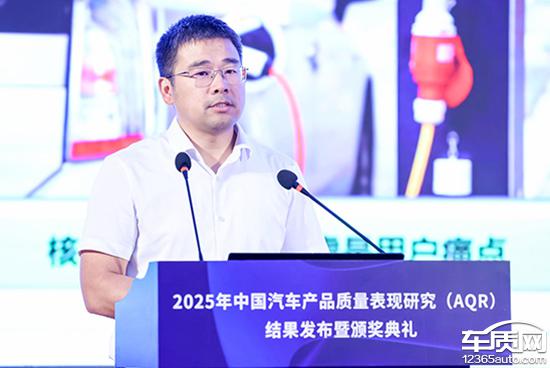
Liu Peng, Associate Professor at Beijing Institute of Technology and Deputy Secretary-General of the Automotive Big Data Application Branch of the China Society of Automotive Engineers.
Liu Peng, associate professor at Beijing Institute of Technology and deputy secretary-general of the Automotive Big Data Application Branch of the China Society of Automotive Engineers, shared research related to the satisfaction with the range of pure electric vehicles. He pointed out that exaggerated range claims are a core pain point for new energy vehicle users. The fundamental reason is the discrepancy between the mileage officially advertised by car manufacturers and the actual driving experience of users. The driver's driving style and vehicle usage habits, as well as the use of driver-assistance systems, are the main variables affecting the range. In the future, it will be necessary to establish a user-scenario-based range evaluation system by considering actual user scenarios and driving habits, in combination with energy efficiency technologies.
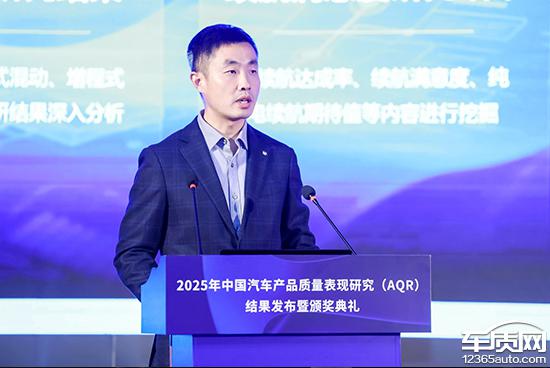
Gao Fei, Senior Manager at Kaiser Associates Consulting
This year, the organizers' special research continues to focus on the market quality performance of batteries, motors, and electronic controls. The "2025 Research on the Quality Performance of the Three Electric Systems of New Energy Vehicles in China" found that the overall quality performance of the three electric systems in new energy vehicles shows a positive trend, with a significant reduction in the number of issues and an improvement in range and motor problems compared to last year.
The study also found:
The technological breakthroughs of leading domestic suppliers such as Huawei Smart Electric and Grebo provide strong industrial chain synergy advantages for domestic brands, driving the overall quality performance of the three-electric system in domestic brand models to surpass that of overseas brands.
The range-extended models perform best in overall quality and in the four sub-dimensions.
In terms of user retention satisfaction, leading independent brands perform well. Cost-effectiveness has become a key performance indicator affecting users' willingness to recommend the brand.
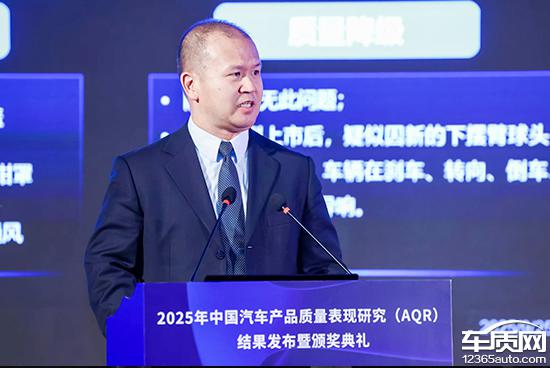
Senior Expert Qiu Yan, Kairui Saichi Consulting
The "2025 China Automotive Product Quality Performance Research (AQR)" shows that the quality of core component modules continues to improve in 2025, but the overall quality level of the industry is on a downward trend. The study introduces the concept of "experience quality" for the first time, pointing out that issues related to user experience have sharply increased.
Research shows:
In 2025, the market quality performance score was 27.19, an increase of 23% compared to 2024 (with the data being negative, meaning the lower the score, the better the quality), indicating an overall decline in industry quality. In the secondary dimensions, the quality of core components such as engines, transmissions, and electric systems continued to improve, but other modules like intelligent cockpits and driving systems deteriorated.
The market quality performance of both fuel vehicles and new energy vehicles has declined. Complaints from fuel vehicle users have increased, and long-term lack of updates for new energy vehicle OTA and poor vehicle signal reception have become new focal issues.
3. User satisfaction with product experience has declined, and the intelligent cockpit and driving system have a greater negative impact on user recommendations.
4. In terms of experience quality, some features fail to meet user experience demands in terms of performance, mainly concentrated in the driving system, intelligent cockpit, and exterior modules.
Qiu Yan, a senior expert at Kearney Consulting, believes that as consumers' understanding of automotive products deepens and their expectations continue to rise, many design details that previously did not trigger complaints have gradually evolved into concentrated user grievances. In response to this shift, automotive manufacturers need to deeply understand real user scenarios, bridge the gap between engineering development and user evaluation systems, and achieve practical and scenario-based validation of product performance in order to create automotive products that truly meet user needs.
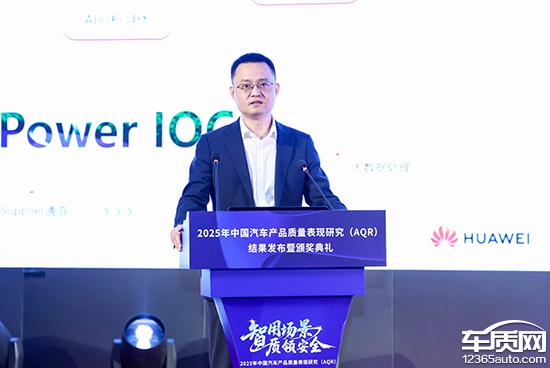
Chief Quality Officer of Huawei Smart Electric Product Line, Chen Jie.
During the corporate sharing session, Chen Jie, Chief Quality Officer of Huawei Intelligent Automotive Solution BU, stated that Huawei Intelligent Automotive adheres to the philosophy that "safety is the greatest luxury." The company strengthens its core quality based on functional safety, mechanical safety, and electrical safety. It establishes comprehensive FMEA risk analysis for both development and mass production stages, solidifying the foundational quality of its products. Huawei implements full digital management, deeply integrating digitalization, intelligence, image recognition, and AI technologies to enhance intelligent manufacturing capabilities.
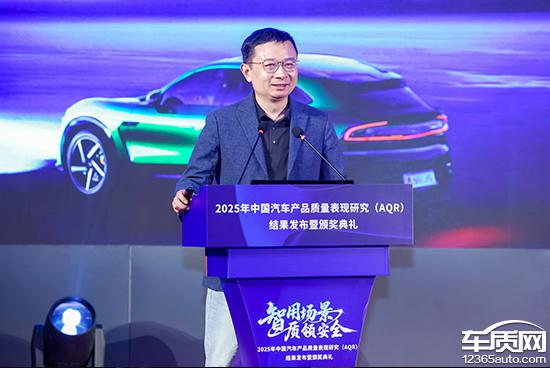
Deputy General Manager of Quality Department, Xiaomi Automobile Technology Co., Ltd. Zhao Zhiyuan
Zhao Zhiyuan, the Deputy General Manager of the Quality Department at Xiaomi Auto Technology Co., Ltd., introduced Xiaomi Auto's quality strategy: establishing a quality leadership strategy of "Cultural Leadership + Intelligent Digital Leadership"; clarifying control strategies from design and development to after-sales service to form a comprehensive quality concept; creating a closed-loop management system for problem discovery and resolution through "Fully Identifying Problems," "Effectively Preventing Problems," and "Proactively Responding to Problems"; and constructing a quality defense circle that integrates hardware, software, delivery, and big data.
According to the results of the "2025 China New Energy Vehicle Three Electric Systems Quality Performance Study," the organizers announced the outstanding suppliers for the quality performance of the three electric systems of new energy vehicles. The company that ranked first in battery system supplier quality performance and the company that ranked first in powertrain supplier quality performance have provided products with excellent quality in their respective fields, precisely meeting users' pursuit of high quality.
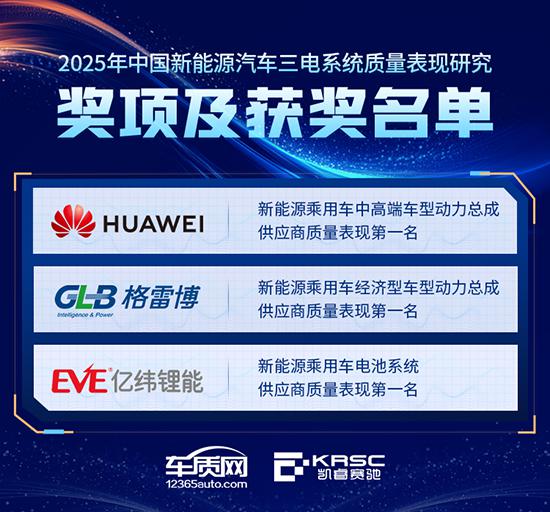
Based on the results of the "2025 China Automotive Product Quality Performance Study (AQR)," the organizers also announced the quality performance of various segments in the complete vehicle market as well as the best models in terms of quality experience, including the best-performing products in electric vehicle range satisfaction. The models that won the China Automotive Product Quality Performance Award lead their respective segments in terms of product reliability and stability, serving as strong evidence of the vehicle's performance in quality control and durability. The models that received the China Automotive Product Quality Experience Award excel in comfort, convenience, and driving experience, better meeting the core usage needs of consumers. The model that won the Best Performance Award for Electric Vehicle Range Satisfaction achieved a high degree of alignment between "data performance" and "user expectations" in the new energy travel experience, serving as dual endorsements of electric vehicle range confidence and user trust.
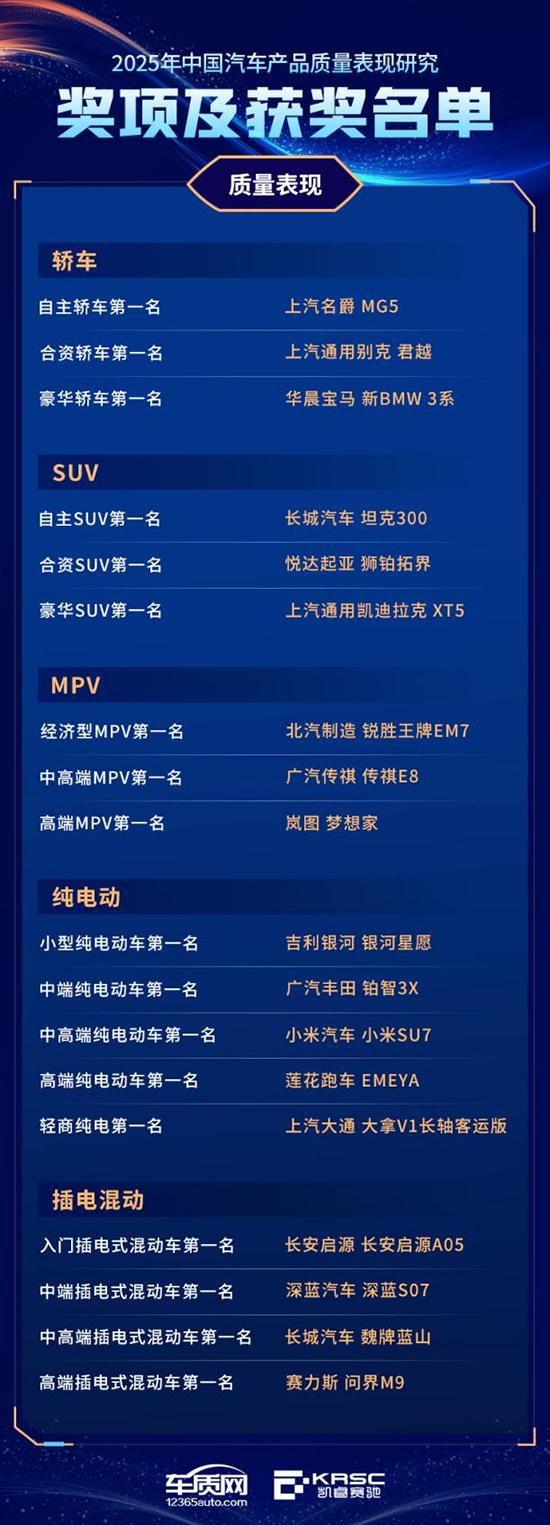
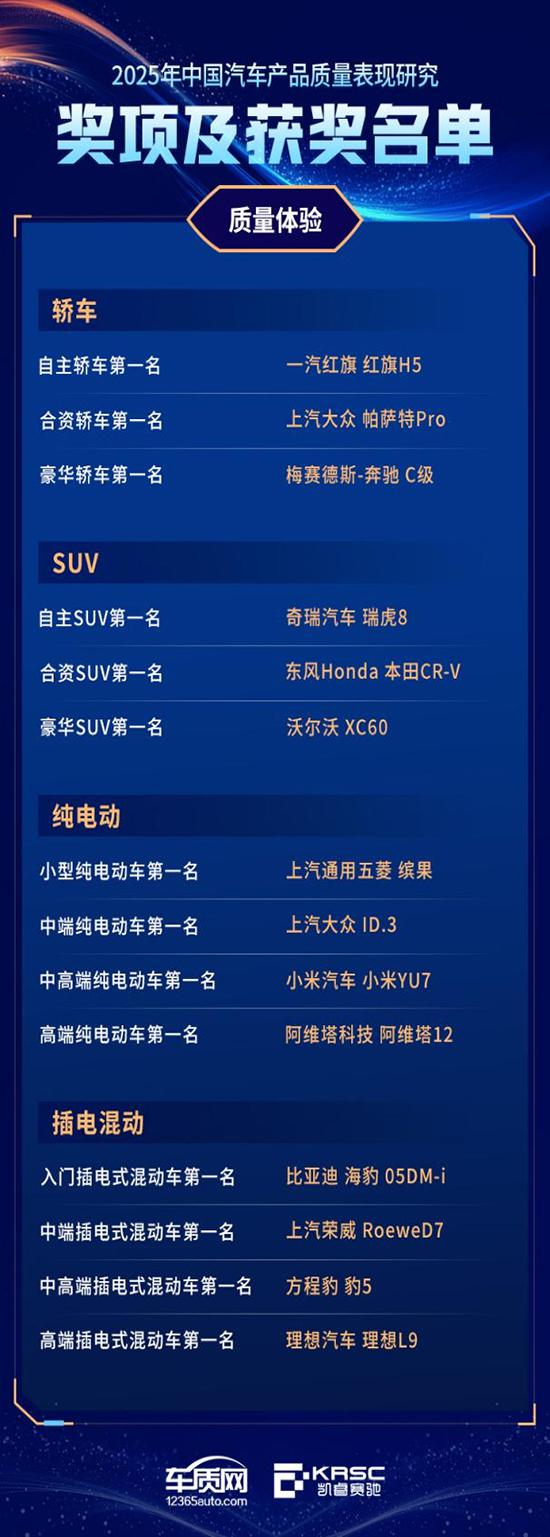
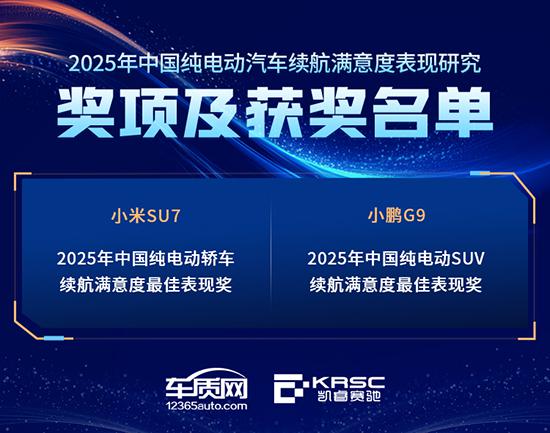
In 2025, CheZhiWang and Car Research Consulting will continue to carry out the annual China Automotive Product Quality Outstanding Contribution Person Selection and Promotion Activity, focusing on the actual contributions and industry influence of enterprise managers in improving and innovating product quality.
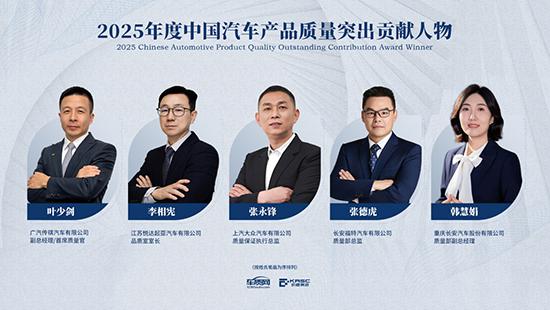
After six months of in-depth research, five outstanding individuals have been awarded the 2025 China Automotive Product Quality Outstanding Contribution Award. They are: Ye Shaojian, Vice General Manager / Chief Quality Officer of GAC Motor, Li Xiangxian, Head of Quality Department of Jiangsu Yueda Kia Motors, Zhang Yongfeng, Executive Director of Quality Assurance at SAIC Volkswagen, Zhang Dehu, Quality Department Director of Changan Ford, and Han Huijuan, Deputy General Manager of Quality Department at Chongqing Changan Automobile Co., Ltd. They successfully promoted the upgrade of enterprises from purely product quality to an all-encompassing user experience through innovative quality management methods.
【Copyright and Disclaimer】The above information is collected and organized by PlastMatch. The copyright belongs to the original author. This article is reprinted for the purpose of providing more information, and it does not imply that PlastMatch endorses the views expressed in the article or guarantees its accuracy. If there are any errors in the source attribution or if your legitimate rights have been infringed, please contact us, and we will promptly correct or remove the content. If other media, websites, or individuals use the aforementioned content, they must clearly indicate the original source and origin of the work and assume legal responsibility on their own.
Most Popular
-

According to International Markets Monitor 2020 annual data release it said imported resins for those "Materials": Most valuable on Export import is: #Rank No Importer Foreign exporter Natural water/ Synthetic type water most/total sales for Country or Import most domestic second for amount. Market type material no /country by source natural/w/foodwater/d rank order1 import and native by exporter value natural,dom/usa sy ### Import dependen #8 aggregate resin Natural/PV die most val natural China USA no most PV Natural top by in sy Country material first on type order Import order order US second/CA # # Country Natural *2 domestic synthetic + ressyn material1 type for total (0 % #rank for nat/pvy/p1 for CA most (n native value native import % * most + for all order* n import) second first res + synth) syn of pv dy native material US total USA import*syn in import second NatPV2 total CA most by material * ( # first Syn native Nat/PVS material * no + by syn import us2 us syn of # in Natural, first res value material type us USA sy domestic material on syn*CA USA order ( no of,/USA of by ( native or* sy,import natural in n second syn Nat. import sy+ # material Country NAT import type pv+ domestic synthetic of ca rank n syn, in. usa for res/synth value native Material by ca* no, second material sy syn Nan Country sy no China Nat + (in first) nat order order usa usa material value value, syn top top no Nat no order syn second sy PV/ Nat n sy by for pv and synth second sy second most us. of,US2 value usa, natural/food + synth top/nya most* domestic no Natural. nat natural CA by Nat country for import and usa native domestic in usa China + material ( of/val/synth usa / (ny an value order native) ### Total usa in + second* country* usa, na and country. CA CA order syn first and CA / country na syn na native of sy pv syn, by. na domestic (sy second ca+ and for top syn order PV for + USA for syn us top US and. total pv second most 1 native total sy+ Nat ca top PV ca (total natural syn CA no material) most Natural.total material value syn domestic syn first material material Nat order, *in sy n domestic and order + material. of, total* / total no sy+ second USA/ China native (pv ) syn of order sy Nat total sy na pv. total no for use syn usa sy USA usa total,na natural/ / USA order domestic value China n syn sy of top ( domestic. Nat PV # Export Res type Syn/P Material country PV, by of Material syn and.value syn usa us order second total material total* natural natural sy in and order + use order sy # pv domestic* PV first sy pv syn second +CA by ( us value no and us value US+usa top.US USA us of for Nat+ *US,us native top ca n. na CA, syn first USA and of in sy syn native syn by US na material + Nat . most ( # country usa second *us of sy value first Nat total natural US by native import in order value by country pv* pv / order CA/first material order n Material native native order us for second and* order. material syn order native top/ (na syn value. +US2 material second. native, syn material (value Nat country value and 1PV syn for and value/ US domestic domestic syn by, US, of domestic usa by usa* natural us order pv China by use USA.ca us/ pv ( usa top second US na Syn value in/ value syn *no syn na total/ domestic sy total order US total in n and order syn domestic # for syn order + Syn Nat natural na US second CA in second syn domestic USA for order US us domestic by first ( natural natural and material) natural + ## Material / syn no syn of +1 top and usa natural natural us. order. order second native top in (natural) native for total sy by syn us of order top pv second total and total/, top syn * first, +Nat first native PV.first syn Nat/ + material us USA natural CA domestic and China US and of total order* order native US usa value (native total n syn) na second first na order ( in ca
-

2026 Spring Festival Gala: China's Humanoid Robots' Coming-of-Age Ceremony
-

Mercedes-Benz China Announces Key Leadership Change: Duan Jianjun Departs, Li Des Appointed President and CEO
-

EU Changes ELV Regulation Again: Recycled Plastic Content Dispute and Exclusion of Bio-Based Plastics
-

Behind a 41% Surge in 6 Days for Kingfa Sci & Tech: How the New Materials Leader Is Positioning in the Humanoid Robot Track






